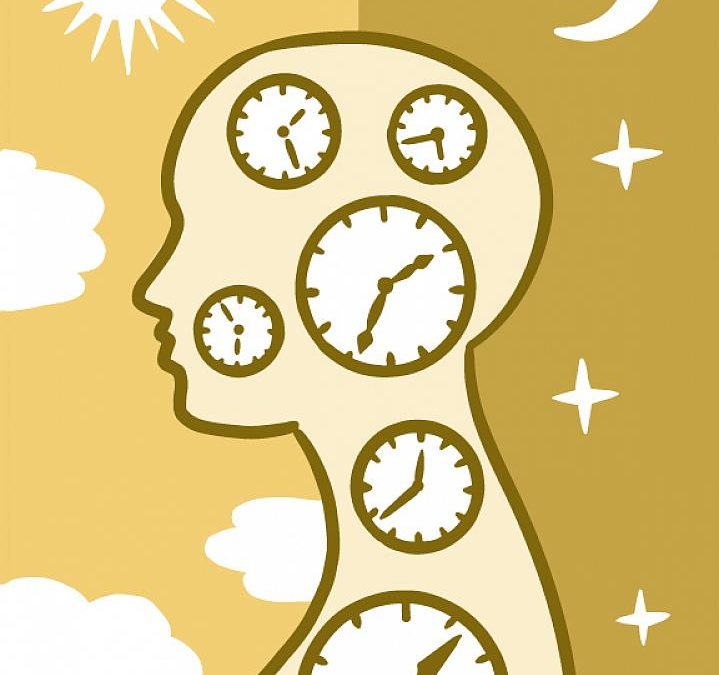Your body has its own internal clock, known as the circadian rhythm, which governs different physiological activities during a 24-hour period. This natural rhythm affects your sleep-wake cycle, hormone production, body temperature, and metabolism. Understanding your circadian cycle is critical for achieving peak health and well-being. In this blog, we’ll look at what circadian rhythms are, how they affect your everyday life, and how to match your schedule with your body’s natural pattern.
Circadian rhythms, or about 24-hour changes in physiology and behaviour, are governed by the circadian clock system, which includes both central and peripheral circadian oscillators.
DEMYSTIFYING CIRCADIAN RHYTHM: Understanding your body’s internal clock!
The phrase “circadian rhythm” is derived from the Latin words “circa,” meaning “around,” and “dies,” meaning “day.” Simply described, circadian rhythms are about 24-hour cycles that regulate the timing of different biological processes in living creatures, including humans. These rhythms are controlled by an internal biological clock, which is predominantly found in the hypothalamic suprachiasmatic nucleus (SCN).
How do Circadian Rhythms Work?
The circadian clock works via a feedback loop that includes a complicated interaction of genes, proteins, and environmental stimuli. Light exposure is one of the most effective cues for synchronizing our internal clock with the external world. Specialized cells in the retina sense light and transmit signals to the SCN, indicating whether it is day or night. In response to these signals, the SCN controls the production of hormones such as melatonin, which regulates sleep-wake cycles, and cortisol, which affects energy levels and alertness.
The Critical Relationship Between Circadian Rhythms and Sleep for Working Employees:
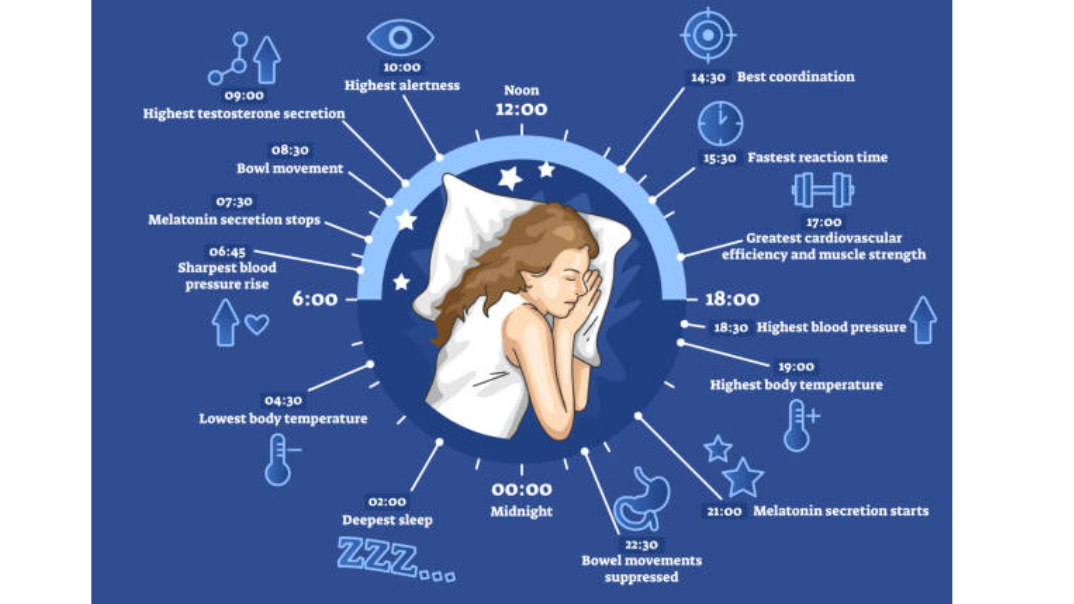
In today’s fast-paced world, when business and personal life frequently clash, maintaining healthy circadian rhythms and prioritizing decent sleep is critical. Circadian rhythms, our body’s internal clock, play an important part in regulating our sleep-wake cycles and general health. For working people, recognizing and honouring these natural biological cycles is vital for good performance, productivity, and long-term health.
EMBRACE YOUR RHYTHM: Energise your day!
1.Importance of quality sleep for working employees
Working employees require quality sleep for good cognitive performance, emotional stability, and general wellness. Adequate sleep promotes memory consolidation, decision-making, problem-solving, and creative thinking, all of which are necessary for professional success. Conversely, sleep deprivation can cause poor focus, impaired judgment, longer response times, and an increased chance of workplace accidents and mistakes. Chronic sleep deprivation has also been related to an increased risk of health problems like obesity, diabetes, heart disease, and mental health disorders.
2. Challenges faced by working employees:
Despite the significance of sleep, many working people experience obstacles that interrupt their circadian cycles and reduce their sleep quality. Irregular work schedules, shift work, long hours, and intense job duties can all lead to sleep disruptions and deprivation. Furthermore, the use of electronic gadgets and artificial light in the evening might disrupt melatonin synthesis and postpone sleep onset, worsening the problem.
Improving sleep quality and circadian rhythm health necessitates a multifaceted strategy that considers a variety of lifestyle variables and environmental impacts. Here are some comprehensive ways to help you get better sleep and align your circadian rhythms:
1. Create a Consistent Sleep Schedule.
To manage your circadian cycles, go to bed and wake up at the same times every day, including weekends. Consistency is essential for teaching your body to recognize when it’s time to sleep and wake up.
2. Plan a Relaxing Bedtime Routine:
Create a relaxing night-time ritual to indicate to your body that it is time to relax and prepare for sleep. Include activities like reading, having a warm bath, practicing relaxation techniques like deep breathing or meditation, and listening to relaxing music.
3. Improve Your Sleep Environment:
Create a cool, dark, and quiet atmosphere conducive to sleep. Invest in a comfy mattress and pillows that promote good sleeping posture. Use blackout curtains or a sleep mask to block out light and reduce outside noise. Use white noise generators or earplugs to block out noises that may interfere with sleep.
4. Limit your exposure to blue light:
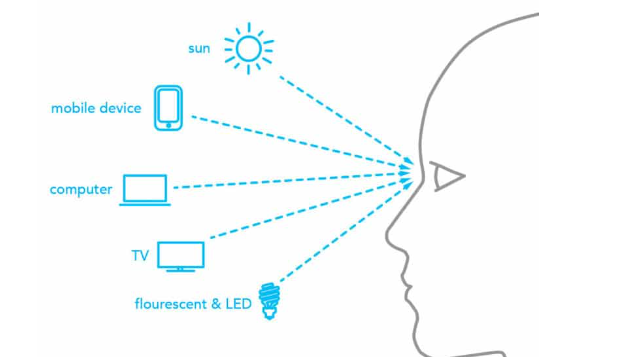
Reduce your exposure to blue light from electronic devices including smartphones, tablets, laptops, and televisions in the evening.
Avoid using electronic devices at least an hour before bedtime, or use blue light filters and night mode settings to decrease the influence on melatonin synthesis. Consider using blue light-blocking glasses in the evening to further decrease your exposure to artificial light.
5. Prioritize Sleep Hygiene:
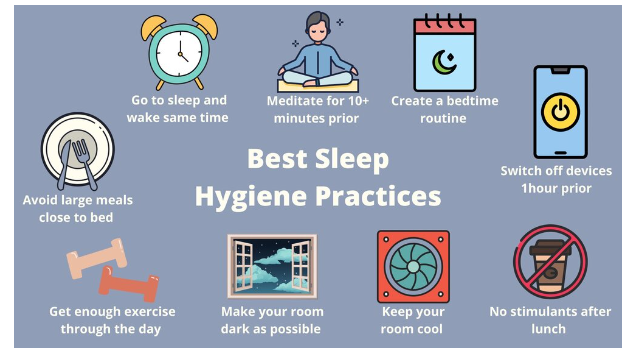
Maintain appropriate sleep hygiene routines to promote healthy sleep patterns. Avoid coffee, nicotine, and large meals close to bedtime, since they can disrupt sleep. Engage in regular physical activity during the day, but avoid strenuous exercise close to bedtime. Relaxation techniques including progressive muscle relaxation, guided imagery, and mindfulness meditation can help you manage your stress.
6. Be exposed to natural light:

HARMONY WITH THE SUN: Your wellness has begun!
Spend time outside during the day to expose oneself to natural light, particularly in the morning. Natural light exposure helps to regulate your circadian cycles and increases attentiveness during the day. If feasible, take short outdoor breaks during the day to absorb sunshine and improve your mood and energy levels.
7. Maintain a healthy diet and lifestyle.
Consume a balanced diet high in fruits, vegetables, whole grains, and lean proteins. Avoid excessive alcohol intake, especially close to bedtime, since it might alter sleep patterns. Limit your intake of stimulants like caffeine and energy drinks, particularly in the afternoon and evening.
8. Practice Relaxation Techniques:
Incorporate relaxation methods into your night-time routine to help you calm down and prepare for sleep. Deep breathing techniques, gradual muscle relaxation, guided imagery, and meditation can help you relax and reduce stress.
By applying these measures and emphasizing sleep hygiene, you may enhance sleep quality, align your circadian cycles, and reap the numerous advantages of restorative and rejuvenating sleep. Remember that consistency and patience are essential, and your body may need time to acclimate to new sleep patterns.
NOURISHING YOUR CIRCADIAN RHYTHM: The role of nutrition and diet

CLOCKWISE FEEDING, HEALTH IS LEADING!
While many things impact our circadian rhythms, such as light exposure, physical activity, and sleep hygiene, nutrition and food are essential for keeping a healthy internal clock. The time and nature of our meals can influence the synchronization of our circadian cycles, affecting sleep quality, energy levels, and general well-being. In this blog article, we’ll look at how nutrition and food may help you maintain a healthy circadian rhythm, as well as practical recommendations for fuelling your body in sync with your internal clock.
1. Meal timing and circadian rhythms:
Our bodies are programmed to absorb and metabolize nutrients more efficiently at specific times of the day, in accordance with our circadian rhythms. According to research, eating meals at predictable intervals throughout the day can help align our internal clocks and promote optimal health. Aim to consume the majority of your calories throughout the day, when your body is naturally more metabolically active, and progressively reduce food consumption in the evening. The molecular clock in the gastrointestinal system is particularly sensitive to the composition and timing of food consumed, and disruption of the clock can lead to metabolic disorders such as obesity and diabetes.
2. Macronutrient Influence:
The content of our meals, particularly the ratio of macronutrients (carbohydrates, protein, and fat), might influence our circadian cycles and sleep quality. Consuming balanced meals that combine carbs, protein, and healthy fats will help regulate blood sugar levels and encourage long-lasting energy.
3. The Importance of Breakfast

Breakfast is generally referred to as the most essential meal of the day, and for good reason: it kick-starts your metabolism and establishes your circadian rhythms. Eating a well-balanced breakfast within an hour or two after waking up will help reset your internal clock, increase energy levels, and improve cognitive functioning throughout the day. Aim for a breakfast that contains protein, healthy fats, and fibre-rich carbs to deliver long-lasting energy and keep you feeling full and content until your next meal.
4. Role of Hydration:
Hydration is another important part of maintaining a healthy circadian rhythm, since dehydration may disturb several physiological processes in the body.
Drink lots of water throughout the day, particularly during daylight hours, to keep hydrated and promote good metabolic function.
Limit your intake of coffee and alcohol, especially in the evening, as these chemicals can dehydrate you and alter your sleep patterns.
5. Adjusting to Time Changes:
When traveling between time zones or adjusting to changes in your daily routine, paying attention to meal timing might assist your body in adapting more rapidly to the new time signals.
Gradually adjusting your meal times to match the local hour at your destination will help reset your circadian rhythms and mitigate the effects of jet lag or shift work.
Nutrition and diet are essential for sustaining a healthy circadian rhythm and general well-being. Prioritizing meal time, eating balanced meals, staying hydrated, and listening to your body’s cues will help you nurture your circadian rhythm and improve your health and vitality. Remember that even little changes in your eating habits can have a huge influence on your internal clock and sleep quality, so make deliberate decisions to fuel your body in accordance with your natural cycles.
FROM DAWN TO DUSK , EATING IN SYNC: Chrono nutrition, a habit to think!
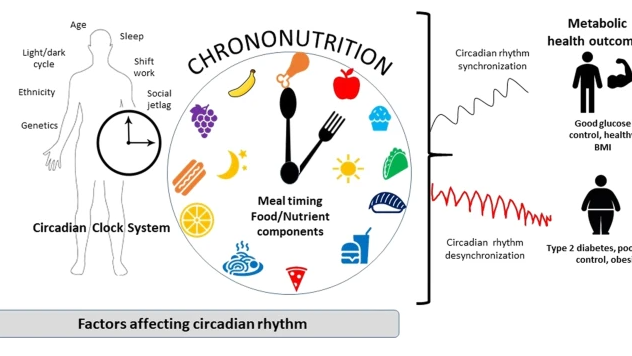
ALIGN YOUR PLATE, THRIVE IN CHRONO STATE!
Chrono-nutrition is the practice of aligning our dietary habits with our circadian rhythm in order to improve sleep quality, increase energy levels during waking hours, improve cognitive performance, and preserve metabolic health. The phrase “chrono-nutrition” refers to the intricate relationship between diet and the body’s internal clock mechanism, known as the circadian rhythm.
Nutritional intake has been identified as a zeitgeber that can synchronise peripheral clocks in the body, including those involved in digestion, absorption, and metabolism. Eating out of rhythm with our biological clock, such as eating at night when the body signals sleep, can have negative health consequences.
The concept of chrono-nutrition encompasses not only the quantity and composition of food, but also the timing of food consumption, which is crucial for general well-being and metabolic health. Individuals can better align their eating habits with their biological clock by adhering to chrono-nutrition principles such as eating the majority of calories and carbohydrates at lunchtime and avoiding late-night dinners, potentially lowering their risk of obesity, type 2 diabetes, and cardiometabolic risk factors.
Chrono nutrition also considers the dietary content of each meal, with an emphasis on adding sleep-promoting elements like tryptophan and magnesium into night-time meals. These nutrients can assist to relax and induce sleep, creating an environment conducive to deep and restful sleep.
Overall, matching eating patterns with the body’s circadian cycle via chrono nutrition can have a major impact on sleep quality and general health. Chrono nutrition, which takes into account aspects such as meal timing, food composition, and individual circadian rhythm variances, can assist promote peaceful and rejuvenating sleep.
UNLOCKING WELLNESS: Understanding the vital importance of circadian rhythm!
In the complex symphony of life, a quiet conductor orchestrates our daily rhythms and routines—the circadian rhythm. This internal clock controls the ebb and flow of our physiological processes, including sleep-wake cycles and hormone regulation, impacting every aspect of our health and well-being. However, in today’s fast-paced society, the importance of circadian rhythms is often overlooked. In this blog article, we’ll look at the fundamental importance of circadian rhythm and why understanding and nourishing it is critical for achieving peak health and vitality.
1. The Master Clock Of Life:
Circadian rhythms act as the body’s internal timekeeper, aligning our biological functions to the natural cycles of day and night.
Circadian rhythms, which are controlled by the brain’s suprachiasmatic nucleus (SCN), have an impact on sleep patterns, hormone production, metabolism, and other functions. Understanding the importance of circadian rhythms is critical for establishing a healthy balance between our internal clock and the outside world.
2. Sleep Quality & Beyond:
Quality sleep is one of the most important benefits of a healthy circadian rhythm, influencing our physical, mental, and emotional well-being. Adequate sleep promotes cognitive performance, memory consolidation, emotional control, and immunological function, but sleep disturbances can cause a wide range of health problems. By focusing on circadian rhythm alignment, we can improve sleep quality and general health and vigor.
3. Hormonal harmony:
Circadian rhythms control hormone release, including cortisol, melatonin, and growth hormone.
Cortisol, sometimes known as the “stress hormone,” follows a diurnal cycle, spiking in the morning to encourage alertness and gradually decreasing during the day.
Melatonin, the “sleep hormone,” is produced in reaction to darkness, indicating the body to prepare for sleep and encouraging restorative sleep.
4. Metabolic Symphony:
Our circadian cycles also impact metabolism and energy control, with meal time being critical to maintaining metabolic health.
Eating patterns that follow our biological clock can improve food absorption, energy expenditure, and blood sugar management, but irregular eating habits can disturb metabolic processes.
By sticking to regular meal times and avoiding late-night eating, we may help our circadian rhythm and improve metabolic equilibrium.
5. Nurturing your circadian rhythm:
Prioritizing circadian rhythm health necessitates deliberate lifestyle decisions and practices that respect our bodies’ natural cycles.
Establishing a consistent sleep schedule, developing a soothing night-time ritual, and improving the sleep environment are critical elements in sustaining circadian rhythm. Additionally, exposure to natural light during the day, being hydrated, and adopting stress management skills can help with circadian rhythm alignment.
MELATONIN AND ITS SOURCES:
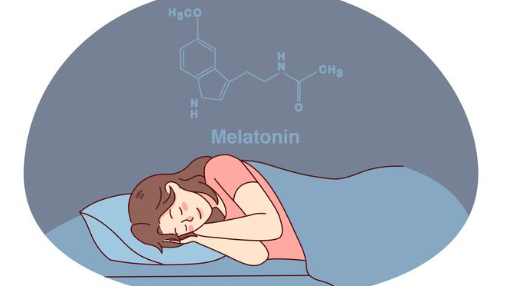
Melatonin is a neurohormone that governs the body’s circadian cycles. Because endogenous melatonin release declines after infancy, increasing food intake may be a viable approach. It can also be used to treat insomnia and sleeping problems. Pasteurized milk is an excellent source of nutrients and bioactive substances. Melatonin has both a sedative impact and the ability to synchronise the sleep-wake cycle. It also plays a critical role in controlling body temperature rhythms. Melatonin rhythms are disturbed in a wide range of circadian rhythm disorders. Melatonin has been shown to be beneficial in treating diseases like jet lag and delayed sleep phase.
Many food databases often lack information on melatonin concentration, however according to existing studies, the following six foods are acknowledged as high sources of melatonin:

Tart Cherries: Tart cherry juice is well-known for its sleep-promoting effects since it increases melatonin levels in the body. It’s worth noting, however, that cherry juice includes a lot of sugar, so eating whole cherries is a healthier way to get melatonin.
Goji Berries: Originating in China, goji berries are recognized for their anti-aging properties and are also high in melatonin, which may help improve sleep quality.
Eggs: Among animal items, eggs are particularly high in melatonin content. They are not only high in melatonin, but also include critical nutrients like protein and iron.
Warm milk: has long been used to treat insomnia due to its high melatonin level. For those who can handle dairy, it may be a feasible alternative.
Fish: Fish, particularly fatty types such as salmon and sardines, are higher in melatonin than other meats. Furthermore, they contain healthy omega-3 fatty acids.
Nuts: Many nuts contain significant quantities of melatonin, with pistachios and almonds being among the highest. Nuts are high in antioxidants, omega-3 fats, and vital minerals.
JET LAG AND CIRCADIAN RHYTHM
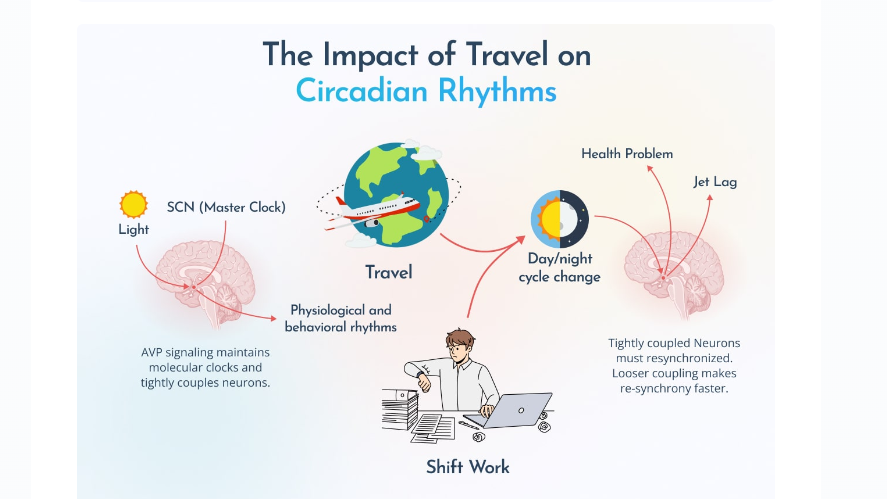
Jet lag is a sleep problem characterised by a person’s internal circadian clock being out of sync with the local time zone. The circadian clock takes around 1-1.5 days to adjust for each time zone travelled. Light is the sole environmental time cue capable of fast resetting the clock. Jet lag can disrupt your sleep and trigger other uncomfortable symptoms that last for days or even weeks after a travel. The likelihood and severity of jet lag are influenced by trip details, arrival time, age, sleep before travel, stress, and alcohol and caffeine consumption. The symptoms may become more acute as more time zones are crossed.
Jet lag can have a substantial impact on general health, as maintaining a healthy internal clock is essential for overall wellness. Chronic circadian rhythm disturbance may increase the risk of diabetes, depression, some malignancies, and other health issues.
There are various measures that can help reduce the effects of jet lag, including gradually altering sleep and eating routines before to travel, staying hydrated during flights, and avoiding caffeine and alcohol. Exposure to natural light at the appropriate times can also assist to reset the internal clock and alleviate jet lag symptoms.
To reset the circadian rhythm following jet lag, numerous strategies can be useful. Here’s how to reset your circadian rhythm after jet lag:
1. Gradually alter your sleep routine: Changing your sleep schedule before you go will help your body adjust to the new time zone faster. For several days before you depart, adjust your bedtime and waking time to match the schedule of your destination. This can assist to reduce the impact of jet lag upon your arrival.
2.Stay hydrated: Drinking enough of fluids during and after your travel will help you avoid dehydration, which can exacerbate jet lag symptoms. Avoid caffeine and alcohol, as they might dehydrate you and affect your sleep.
3. Exposure to natural light can help restore your circadian clock. If you need to get up earlier at your location, go out in the early morning sun. If you want to wake up later, don’t go out in the sun until late afternoon.
4. Try a brief fast: A brief fast before and during travel may help to restore your circadian rhythms. This approach has not been studied in clinical trials, however there are numerous testimonials to its usefulness. If you wish to attempt this, consult with your doctor to see if fasting is appropriate for you.
5. Light therapy, which exposes you to strong light at specified times of day, can help reset your circadian cycle. This is especially useful if you’re travelling eastward and need to adjust your sleep routine.
Avoid napping during the day, especially in the first few days after you arrive. This can make it more difficult to adjust to your new time zone and sleep schedule.
6.Try melatonin. Melatonin is a hormone that helps regulate the sleep-wake cycle. Taking melatonin pills may assist to reset your circadian clock and alleviate jet lag symptoms. However, you should see your doctor before using melatonin, as it can mix with other medications and cause negative effects.
in conclusion, understanding circadian rhythms and chrononutrition is critical for promoting overall well-being. We can improve our general health, vitality, and quality of life by respecting our bodies’ natural rhythms and synchronising our eating habits accordingly. As awareness grows, incorporating these ideas into our everyday routines can serve as a foundation for proactive health management for both individuals and communities.
References:
https://www.health.harvard.edu/staying-healthy/how-to-reset-your-internal-clock-to-combat-jet-lag
https://www.health.harvard.edu/blog/resetting-your-circadian-clock-to-minimize-jet-lag-2016090810279
https://www.ncbi.nlm.nih.gov/pmc/articles/PMC2829880
https://www.ncbi.nlm.nih.gov/pmc/articles/PMC1188623

